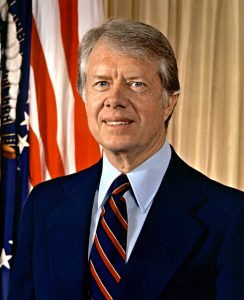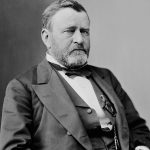 As of the writing of this post, Jimmy Carter is at home receiving hospice care. However many hours, days, or weeks are left to him, he can rest assured of near-universal acclaim for having conducted the best post-presidency in the modern era.
As of the writing of this post, Jimmy Carter is at home receiving hospice care. However many hours, days, or weeks are left to him, he can rest assured of near-universal acclaim for having conducted the best post-presidency in the modern era.
A United States President nowadays commands awesome power, including quite literally the ability to instigate the end of civilization as we know it. That that power is wielded by a democratically elected official who can count on being held in contempt by a portion of the electorate is an irony of the modern age. Carter was of course not immune to that: Marlene recalls working as a librarian the 1980s and being asked for Rosalynn Carter memoir First Lady from Plains by a slightly different title: “First Lady Complains”.
Presidential power is not the domain of a Superman single-handedly changing the world; many hands are involved. What the President can do at best is to inspire, to lead, to exemplify, to cajole, to persuade, but almost never to directly do. Carter exemplified some of the best of that indirectness. Let us consider a few incidents.
Carter survived Admiral Hyman RIckover’s job interview – undoubtedly one of the toughest anywhere in the world – to serve in the U.S. Navy’s nuclear submarine service. In 1952, an experimental nuclear reactor in Ontario, Canada, the Chalk River NRX, suffered a partial meltdown that resulted in a radioactive mess. The cleanup took 14 months, and since the NRX was being used to test fuel for U.S. nuclear submarines, Canada invited the U.S. Navy to provide men to assist with the cleanup (and to supplement the Canadian reactor staff, many of whom were reaching their legal radiation exposure limits). Rickover, seeing an excellent training opportunity, sent them over, including a team led by Carter.
Carter’s team was responsible for performing some of the disassembly of parts of the reactor and had to move quickly. According to his memoirs, they had about 90 seconds apiece to do their work before reaching the maximum permitted exposure. They came, they planned, they did their work, and went back home. While it left an impression on Carter – having to test your urine for six months before it stopped registering as radioactive tends to do that to a person – the tale subsequently grew in the telling (by others). Some accounts published in recent years might give one the impression that he saved Ottawa (which wasn’t in danger) by personally leading the entire cleanup effort (he was responsible for just one team consisting of between one and dozen men as part of a much larger operation run by the Canadians). But Carter himself had a more accurate perspective: he did his duty bravely, as many others did, and ensured that the men he led did theirs.
One of Carter’s signature accomplishments during his presidency was the signing of the Camp David Accords that normalized diplomatic relations between Israel and Egypt. This time, Carter personally chivvied the negotiations along, including taking Anwar Sadat and Menachem Begin on a tour of the Gettysburg battlefield to ponder the cost of war. While the Accords did not achieve all that Carter hoped for, as he had tried to get Syria and Jordan to participate, they led to a peace between Israel and Egypt that remains unbroken.
However, Carter’s best legacy may ultimately have nothing to do with nuclear power or high diplomacy. In fact, that legacy may be marked by an absence: specifically, that of Dracunculus medinensis, i.e., the guinea worm. In 1986, Carter’s foundation started an effort to eradicate the guinea worm. This project is the epitome of a group effort using boring means to achieve its aim. An eradication program inherently involves many international and national health agencies, and guinea worms do not lend themselves to extinction by the heroic efforts of genius medical research. Instead, the weapons are education, water filters, and patience. But nearly 40 years of patience can be enough: there were about 3.5 million cases of guinea worm disease in 1986. Last year, there were about 13.
Carter likely will not live to hear the World Health Organization’s proclamation of the end of the disease – but he can rest easy knowing that his efforts will outlive him and achieve a permanent solution to a major problem; the sort of legacy not every U.S. President is accorded.








